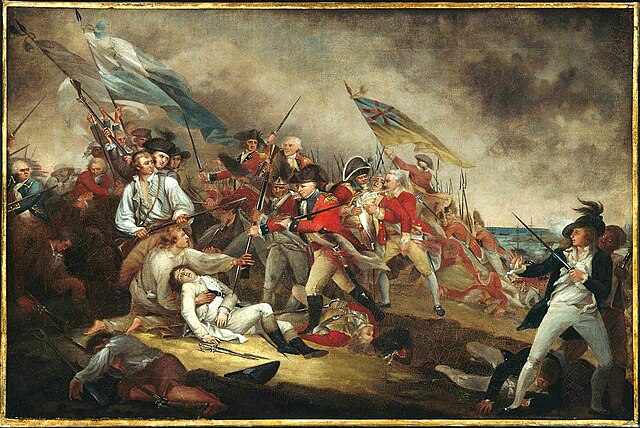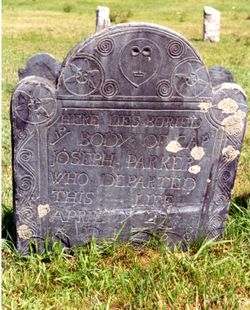Jacob Frost’s Revolutionary War
Frost’s statement, part of his plea for a federal government pension, said:
on the 19th day of April 1775, on the alarm of the enemys being on their march from Boston to Lexington, at Tewksbury in the State of Massachusetts, his then residence, he then being a minute man, he marched to Concord in the company commanded by Capt. John Trull of the Massachusetts militia and pursued the enemy to Boston and he immediately enlisted at Cambridge near Boston for a term of eight months, in the company commanded by Capt. Benjamin Walker, in the regiment commanded by Col. Ebenezer Bridge,The Nova Scotia diarist Simeon Perkins wrote on 1 April that “The Centurion man of war is off the harbour.”
and was employed on the night previous to the battle of Bunker Hill on the 17th. Day of June 1775, in throwing up breast works—was in the battle and was then severely wounded in the hip, and entirely disabled, and he laid among the wounded until the day after the battle—when he was taken up by the British & carried to Boston & there kept a prisoner until March 1776, at which time the British evacuated Boston—when he was put on board a British man of war ship, called the Centurian—& carried in Irons to Halifax in Nova Scotia—
and there kept in prison untill the 21st. of June 1776, when he with some others found means to escape from prison, & wandered almost without clothes & entirely without money through the woods, till he finally arrived at his residence in said Tewksbury the last of September 1776, being one year & five months absent from his enlistment aforesaid until his return to his home.That certificate, dated 29 Aug 1788, stated that Frost, then aged thirty-five, had been disabled by “one Musket ball, through his left hip bone.” He was awarded a pension of 15 shillings per month.
In the month of July 1779 [actually 1780] he again enlisted at Tewksbury aforesaid for the term of three months, as a private in the company commanded by Capt Amos Foster, and was immediately appointed a sergeant, said company was attached to the regiment commanded by Colo. [John] Jacobs, and was marched to Rhode Island where he served said three months—and was there verbally discharged—
He further represents that he is an Invalid Pensioner, as will appear by the certificate hereunto annexed—
In a separate 1832 document, Frost added:
during the period of three months, that I served as orderly sargeant in the Company commanded by Capt. Amos Foster in Col. Jacobs regiment, on Rhode Island in the year A.D. 1779—the orderly Sargeant was appointed to act as a Lieut. in consequence of the absence of one of the Lieuts—and I was thereupon appointed to fill the vacancy and served the term of three months in that capacity—and I further declare that I did not receive a warrant from any officer, but acted without one.Other veterans attested to Frost’s work as the company’s orderly sergeant.
TOMORROW: The literary version.
(The photograph above, courtesy of Classic New England, shows the Brown Tavern on Main Street in Tewksbury, built in 1740. The prominent porch is a later addition, as is the bank branch inside.)




